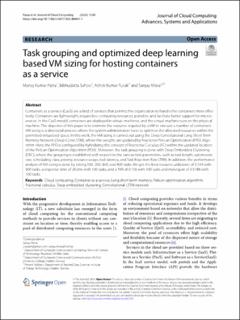| dc.contributor.author | Patra, Manoj Kumar | |
| dc.contributor.author | Sahoo, Bibhudatta | |
| dc.contributor.author | Turuk, Ashok Kumar | |
| dc.contributor.author | Misra, Sanjay | |
| dc.date.accessioned | 2023-09-04T21:05:19Z | |
| dc.date.available | 2023-09-04T21:05:19Z | |
| dc.date.created | 2023-04-26T09:08:35Z | |
| dc.date.issued | 2023 | |
| dc.identifier.citation | The Journal of Cloud Computing: Advances, Systems and Applications. 2023, 12, Artikkel 65. | en_US |
| dc.identifier.issn | 2192-113X | |
| dc.identifier.uri | https://hdl.handle.net/11250/3087379 | |
| dc.description.abstract | Containers as a service (CaaS) are a kind of services that permits the organization to handle the containers more effectively. Containers are lightweight, require less computing resources, portable, and facilitate better support for microservices. In the CaaS model, containers are deployed in virtual machines, and the virtual machine runs on the physical machine. The objective of this paper is to estimate the resource required by a VM to execute a number of containers. VM sizing is a directorial process where the system administrators have to optimize the allocated resources within the permitted virtualized space. In this work, the VM sizing is carried out using the Deep Convolutional Long Short Term Memory Network (Deep-ConvLSTM), where the weights are updated by Fractional Pelican Optimization (FPO) Algorithm. Here, the FPO is configured by hybridizing the concept of Fractional Calculus (FC) within the updated location of the Pelican Optimization Algorithm (POA). Moreover, the task grouping is done with Deep Embedded Clustering (DEC), where the grouping is established with respect to the various task parameters, such as task length, submission rate, scheduling class, priority, resource usage, task latency, and Task Rejection Rate (TRR). In addition, the performance analysis of VM sizing is done by taking 100, 200, 300, and 400 tasks. We got the best resource utilization of 0.104 with 300 tasks, a response time of 262ms with 100 tasks, and a TRR of 0.156 with 100 tasks and makespan of 0.5788 with 100 tasks. | en_US |
| dc.language.iso | eng | en_US |
| dc.publisher | Springer | en_US |
| dc.rights | Navngivelse 4.0 Internasjonal | * |
| dc.rights.uri | http://creativecommons.org/licenses/by/4.0/deed.no | * |
| dc.subject | cloud computing | en_US |
| dc.subject | container as a service | en_US |
| dc.subject | long short term memory | en_US |
| dc.subject | pelican optimization algorithm | en_US |
| dc.subject | fractional calculus | en_US |
| dc.subject | deep embedded clustering | en_US |
| dc.subject | convolutional LSTM network | en_US |
| dc.title | Task grouping and optimized deep learning based VM sizing for hosting containers as a service | en_US |
| dc.type | Peer reviewed | en_US |
| dc.type | Journal article | en_US |
| dc.description.version | publishedVersion | en_US |
| dc.subject.nsi | VDP::Teknologi: 500::Informasjons- og kommunikasjonsteknologi: 550 | en_US |
| dc.source.volume | 12 | en_US |
| dc.source.journal | The Journal of Cloud Computing: Advances, Systems and Applications | en_US |
| dc.identifier.doi | 10.1186/s13677-023-00441-7 | |
| dc.identifier.cristin | 2143402 | |
| dc.source.articlenumber | 65 | en_US |
| cristin.ispublished | true | |
| cristin.fulltext | original | |
| cristin.qualitycode | 1 | |

